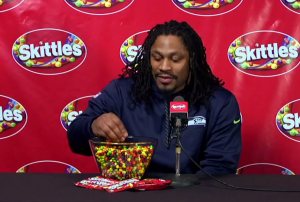All star running back for the Seattle Seahawks Marshawn Lynch loves Skittles. The very few times we hear Marshawn talk on T.V., its often about his obsession with Skittles and how it started with his mother when he was a child. He habitually eats his Skittles on the sidelines during a game after a big drive in order to keep his energy levels up. But is Lynch right to eat such candy in the middle of a high energy NFL game? How do sugary candies such as Skittles effect our short-term energy?
We’ve all heard that sweets such as candy and soda make us “hyper”, especially children. But Dr. Aaron E. Carroll sternly rejects this “myth” and suggests that candy does not raise the children’s energy levels. Rather, parents are to blame for over-exaggerating their childrens’ behavior. He sites an experiment where an entire group of children were given a sugary-free drink, and half of the parents were lied to and told that there was sugar in the beverage. The results were that that those parents rated their children as being more hyperactive than the other group, “confirming that this myth is entirely in the parent’s heads.” But the thing that I find wrong with this experiment is the principle that once a children is drinking a soda which he assumes has sugar in it, he or she will be inclined to “act” as if they are under the spell of sugar. For example, I read about a study where someone brought a keg of unalcoholic beer to a party, and everyone drinking it acted as if they were drunk even though they were not. I believe the same principle applies to this expiriment in that the children trick themselves into hyperactivity.
Another study that was conducted my Dr. Tamborlane from Yale took a closer look at the 
 physical effects of children that have been given sugar against children that have not. The results were that the kids that were given sugar had higher levels of adrenaline, which is consistent with Marshawn’s reasoning for consuming such junk-food. But what also was found was an increase in insulin with the children who consumed the sugar which is linked to ADHD and loss of focus, a sign that Lynch should rethink his decision. I believe that this simple experiment was conducted well in that scientists were able to effectively witness changes in the children who were given sugar that were not present in the control group. If the trial weren’t randomized, perhaps one could argue that reverse causation could be possible in that children with more adrenaline could desire candy more, but that is not the case here.
physical effects of children that have been given sugar against children that have not. The results were that the kids that were given sugar had higher levels of adrenaline, which is consistent with Marshawn’s reasoning for consuming such junk-food. But what also was found was an increase in insulin with the children who consumed the sugar which is linked to ADHD and loss of focus, a sign that Lynch should rethink his decision. I believe that this simple experiment was conducted well in that scientists were able to effectively witness changes in the children who were given sugar that were not present in the control group. If the trial weren’t randomized, perhaps one could argue that reverse causation could be possible in that children with more adrenaline could desire candy more, but that is not the case here.
In an intense NFL football game, playing on a high energy team such as the Seahawks, I believe it is helpful for a star player such as Marshawn Lynch to consume sugar on the sideline. For the soul reason of the increase in adrenaline, which is so important in a high impact sport such as football, Lynch benefits from the Skittles; and everyone can see that on the field.


Lynch eats the skittles because they’re his favorite snack and because its gives him that extra boost of energy. Even if the energy from the skittles is minimal it is still putting food in his body and keeping him focused. Also it may just be a placebo effect and he just thinks he plays better when he eats skittles.